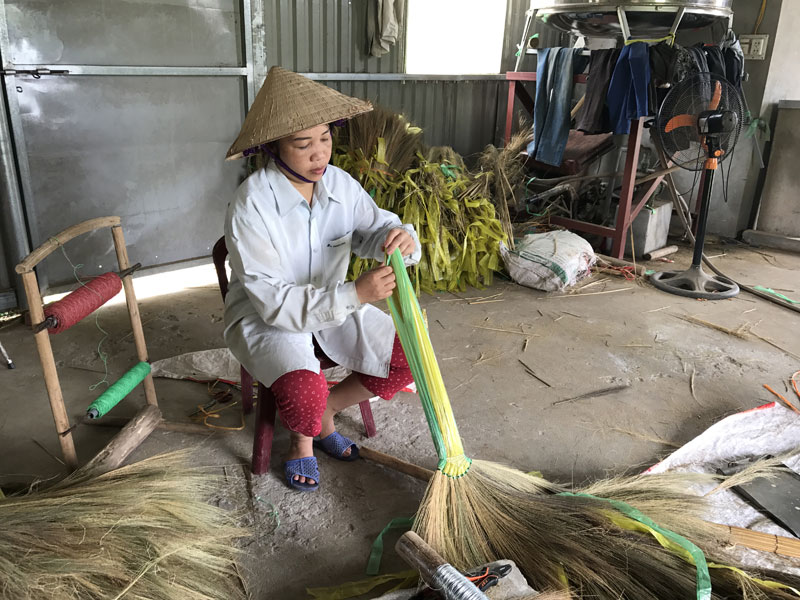
(HBG) – The making of "chit” brooms in Hop Thinh commune (Ky Son) has developed strongly in recent years, bringing stable incomes for many households. "Chit” broom-making workshops have generated jobs for a lot of farmers in post-harvest time.

The "chit” broom-making workshop of Le Thi Nuong (Tu Do hamlet, Hop
Thinh commune, Ky Son district) produces 2,000-3,000 brooms each month with
high economic efficiency.
In 2005, "chit” broom-making appeared at a small
scale in some hamlets. At first, several households made brooms for use at home
and retail sales. Recognising the strong consumption potential of the item,
many families have engaged in broom-making. Since then, this job has grown strongly
in Hop Thinh commune. So far, the commune has had nearly 20 big and small
"chit” broom-making workshops, becoming a main occupation that brings high
economic benefits to many households.
We visited the broom-making workshop of Nguyen
Thi Dao (Doc Lap commune), one of the pioneers in making "chit” brooms in the
commune, as introduced by communal officials. At present, her family has three
broom production workshops, creating jobs for 15 full-time labourers and nearly
20 seasonal ones with the average income of 3 million VND per person per month.
Dao said "I got involved in making brooms by chance. In 2004, when visiting a
relative in Yen Bai who is working at a rattan- bamboo knitting export company,
I was introduced to broom-making and found this job quite simple and easy to
do, suitable with the rural environment. After discussing the occupation with
my family members, I decided to learn to make "chit” brooms as a means of
living.” In 2005, Dao used 30 million VND, which came from her family and the Bank
for Social Policies, to buy equipment and materials. Due to meagre capital, in
the first year, she just imported five tonnes of "chit” material. Dao and her
husband made brooms by themselves and sold them in the local market. Thanks to
good quality and reasonable prices, the products were quickly sold out. At that
time, each broom was sold at 5,000 VND, and excluding all expenses, Dao’s
family could manage to pay all debts. So far, each of her broom-making workshop
exports around 6,000-7,000 brooms each month to
China,
the
Republic of
Korea,
and
Malaysia.
We also visited the "chit” broom-making workshop
of Le Thi Nuong (Tu Do commune). Getting involved in broom-making three years
ago, each month her workshop could produce 2,000-3,000 brooms. The wholesale
prices range from 17,000 VND to 20,000 VND per broom. Excluding the production
cost, the workshop brings her family an annual income of over 100 million VND.
Nuong said "To develop in the long run, it is necessary to have stable "chit”
material sources. At present, I’m buying "chit” mainly from Dien Bien province.
The best material is selected from January to February when "chit” flowers have
yet to bloom. This trade is not too heavy, but it requires diligence. It’s okay
to make brooms at any time, so many farmers learn to make brooms after their
harvest time.”
Vice Chairman of the People’s Committee of Hop
Thinh commune Nguyen Van Thiet said to ensure the stable outlets for the
products, it is necessary to mobilise people to join the production and establish
a cooperation group or a cooperative to build own brand names for the products.
Local authorities should continuously create favourable conditions for farmers
to access loans to expand production to increase their income as well as
generate jobs for local residents.
Hoang
Anh
In Lac Thuy district, communes have been succeeded in promoting their One Commune-One Product (OCOP) products while others are still struggling to position their typical farming products in market. Some communes in the district still fail to have their products met OCOP programme’s requirements, while others have seen their certifications expired.
The inspectorate agency of Hoa Binh province has issued Official Dispatch No. 1090/TTr-PCTN to provincial departments, agencies, localities, business associations, enterprises, and investors regarding measures to improve informal component indexes of the Provincial Competitiveness Index (PCI).
Hoa Binh is taking concrete steps to improve its investment environment, with a strong focus on supporting businesses, settling obstacles for strategic investors, and creating opportunities for robust development in the coming years.
Under the blazing early summer sun, the construction site of Nhuan Trach Industrial Park (IP) in Luong Son district is abuzz with activities from dawn to dusk, a testament to the determination of the investor to meet their construction targets on schedule.



